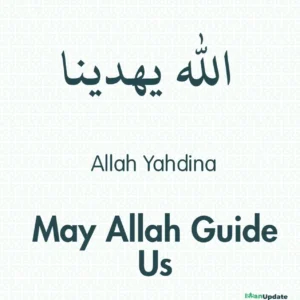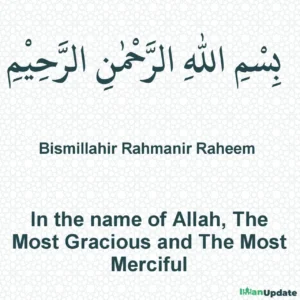First Kalma in Arabic and English Translation (1st Kalma)

There are six Kalimas in total, and millions of people around the world have memorized them. These Kalimas teach important beliefs about Allah and Islam. They are educational and are often taught to children when they are young.
The First Kalma is known as the Kalma Tayyibah (The Pure Word). It is a declaration of faith that emphasizes the oneness of Allah and the prophethood of Muhammad (PBUH). Here is the Arabic text followed by its transliteration and translation.
First Kalma in Arabic Copy and Paste
The 1st kalma is written in Arabic as:
لَا إِلَٰهَ إِلَّا ٱللَّٰهُ مُحَمَّدٌ رَسُولُ ٱللَّٰهِ
Transliteration
Laa ilaaha illallaahu, Muhammadur Rasoolullaah
First Kalma Translation in English
First kalma translates as There is no deity but Allah, Prophet Muhammad is his messenger.
La ilaha illa Allah means nothing worshipped is worthy of worship except Allah. Muhammadun Rasul Allah is the assertion of the message of Prophet Muhammad and to believe in it and to adhere to it by speech, action and faith.
As mentioned above, this statement of tawheed encompasses two concepts.
The first phrase has two parts:
- Laa Ilaaha: Which negates that anything or anyone deserves to be worshipped other than Allah.
- Illa-Allah: Which affirms that Allah alone truly deserves to be worshipped.
Allah SWT said:
“And (remember) when Ibraheem said to his father and his people: “Verily, I am innocent of what you worship, except Him (i. e Allah alone I worship none) Who did create me and verily, he will guide me. Surah Zukhruf: 26-27
Therefore it’s not sufficient to worship Allah rather you must worship Him alone.
The Tawheed of a person is not correct except by singling out Allah in worship and freeing one’s self from polytheism shirk and those who commit it.
It has been mentioned in a narration that “Laa Ilaaha Ill-Allah” is the key to paradise. But does everyone who says it deserve to have the door of paradise opened for him?
Wahab ibn Munabbih was asked: “isn’t the statement “Laa Ilaaha Ill-Allah” the key to paradise? He answered:
“Yes but every key has a set of teeth. If you come with the key that has the correct set of grooves the door will open for you. If you come with a key that doesn’t have the correct set of grooves the door will not open for you.”
READ ALSO: Hayya Alal Falah and Hayya Alas Salah Meaning & Arabic
7 Essential Conditions of 1st Kalma
Scholars of Islam have identified 7 crucial conditions for this phrase to serve as a key to paradise and bring benefits to the one who utters it, based on evidence from the Qur’an and Sunnah:
- Knowledge: Understanding what is affirmed and negated in the Shahadah
- Certainty: Absolute conviction in the meaning, without speculation or doubt
- Acceptance and Submission: Heartfelt and verbal acceptance of its implications
- Following the Guidance: Acting in accordance with its teachings
- Truthfulness: Sincere declaration from the heart, matching words and actions
- Sincerity: Actions free from shirk, dedicated solely to Allah
- Love and Devotion: Embracing the phrase, its implications, and those who act upon it, with hatred towards opposition
Fulfilling these conditions unlocks the transformative power of La ilaha illallah, leading to a life of purpose, devotion, and ultimately, paradise.
Meaning Of Muhammadun Rasulullah
The declaration “Muhammadun Rasul Allah” is more than just a phrase – it’s a commitment to embrace the message of Muhammad (peace be upon him) and live by his teachings. To truly benefit from this testimony, one must:
- Obey the Prophet’s commands, as Allah commands us to (Surah Nisa, 80)
- Believe in all that the Prophet informed us, without doubting or denying his words
- Avoid everything he prohibited, including shirk, major and minor sins, and disliked actions
- Worship Allah only as legislated by the Prophet, rejecting all innovations in religion (Muslim)
By fulfilling these conditions, one’s faith increases, and they will be saved on the Day of Judgment, when love for the Prophet and obedience to his teachings will be the key to paradise.
Remember, true love for the Prophet results in obedience, and obedience leads to salvation.
Loving the Prophet isn’t just a feeling, but a duty that requires action. To truly love him means to love him more than oneself, prioritizing his teachings and example above all else. This love is demonstrated through:
- Obedience to his commands and implementation of his Sunnah
- Emulating his character and qualities
- Mentioning and praising him often
- Longing to meet him
- Respecting him and his legacy
- Hating those who oppose Allah and the Prophet
- Avoiding innovators and those who introduce new matters in religion
- Loving and supporting his family, companions, and those he loved
- Emulating his noble character and qualities
Remember, true love is proven through obedience and action, not just feelings. Show your love for the Prophet by living his teachings and example.
The Prophet’s Exemplary Character
Aishah (RA) described the Prophet’s character as the living embodiment of the Quran (Muslim). He embodied the highest moral standards, avoiding anything not commanded by the Quran. He was:
- The bravest in battle
- The most generous, especially in Ramadan
- The most sincere and forbearing
- Never seeking personal revenge, yet strict in upholding Allah’s commands
- Humble and tranquil, shyer than a secluded virgin
- The best of husbands and fathers to his family
- The most merciful to all creation, encouraging others to do the same
The Prophet’s character was a shining example of moral excellence, inspiring generations to strive for similar virtues.
The First Kalma is a powerful and significant declaration of faith in Islam. Known as the Kalma Tayyibah (The Pure Word), it captures the essence of a Muslim’s belief in the oneness of Allah and the prophethood of Muhammad (PBUH).

The First Kalma: Kalma Tayyibah
This simple yet profound statement forms the foundation of the Islamic faith and is the starting point for any individual embracing Islam.
Understanding the Meaning
The First Kalma is divided into two important parts:
- Laa ilaaha illallaahu – This means “There is no god but Allah.” It affirms the concept of Tawhid, which is the belief in the absolute oneness of Allah. For a Muslim, this is the central belief: that no one else is worthy of worship, reverence, or reliance except Allah, the Creator of all.
- Muhammadur Rasoolullaah – This means “Muhammad is the Messenger of Allah.” Here, Muslims recognize Prophet Muhammad (PBUH) as the final prophet and messenger, who was sent to guide humanity toward righteousness and teach the final revelation from Allah, which is the Holy Qur’an.
The Significance of the 1st Kalma
The First Kalma is not just words; it is a belief that governs a Muslim’s entire life. When someone recites the Kalma, they affirm:
- Belief in Allah’s Oneness: By declaring that there is no god but Allah, a Muslim rejects all forms of idolatry and polytheism. Allah is the sole Creator, Sustainer, and Sovereign of the universe.
- Belief in Prophet Muhammad (PBUH): The Kalma acknowledges the finality of the Prophethood of Muhammad (PBUH). Following his teachings, as recorded in the Qur’an and Hadith, is essential for living a life in accordance with the guidance of Allah.
- Entry into Islam: Reciting the First Kalma is often the first step for someone who wants to become a Muslim. It marks their acceptance of the core beliefs of Islam.
Why Is It Called Kalma Tayyibah?
The word Tayyibah means “pure” or “wholesome,” which reflects the purity and simplicity of this declaration. The First Kalma is free from any association of partners with Allah (shirk), making it the purest form of belief a Muslim can have.
Conclusion
The First Kalma, Kalma Tayyibah, holds a central place in the heart of every Muslim. It is the core of Islamic belief, affirming both the oneness of Allah and the finality of the Prophethood of Muhammad (PBUH).
This simple yet profound statement shapes the lives of Muslims and provides them with a constant reminder of their faith.
Whether someone is reciting it for the first time or repeating it as part of their daily remembrance, the First Kalma connects every Muslim to the most fundamental truths of Islam.






